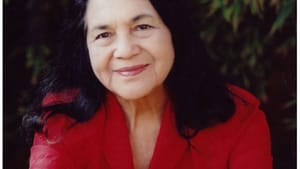Stay in the Loop
BSR publishes on a weekly schedule, with an email newsletter every Wednesday and Thursday morning. There’s no paywall, and subscribing is always free.
In the field
Peter Bratt's documentary 'Dolores'

Before crowds echoed “Yes, we can” at rallies for Barack Obama, labor and civil rights activist Dolores Huerta shouted, “Sí se puede.” A new documentary, Dolores, directed by Peter Bratt (and co-produced with Carlos Santana), follows the life and career of one of the most important activists in U.S. history. As an organizer for the United Farm Workers (UFW) alongside Cesar Chavez, Huerta organized a labor strike against exploitative grape growers in California in 1965.
The farmworkers in Delano, California, mostly Filipino, were paid below federal minimum wage and endured harsh working conditions, such as extreme exposure to pesticides. The UFW led boycotts, marches, and other forms of nonviolent direct action, which sometimes left demonstrators vulnerable to physical violence by law enforcement. Meanwhile, Huerta lobbied for worker protections; she helped advocate for the California Agricultural Labor Relations Act, which established collective bargaining for state farmworkers, passed in 1975.
Still fighting for your food
Huerta’s 11 children were interviewed for the movie. It is emotionally striking to see the labor leader as a maternal figure and to hear what children of a single-parent household sacrifice when their mother works in the field.
Huerta faced immense criticism for having 11 children with two partners and experienced everyday sexism as a community leader who also happened to be a woman. While visiting New York during the grape boycott, she met and befriended feminist leader and Ms. magazine co-founder Gloria Steinem. This was a turning point for her, as the women’s liberation movement helped Huerta incorporate women’s empowerment into her activism; women were already at the front lines of UFW.
When the UFW executive board voted on new leadership after Chavez’s death in 1993, Huerta was not elected. This was a major disappointment to many, as Huerta had not only given her life to the labor movement but also co-founded the organization with Chavez in 1960.
Although the film reflected on Huerta’s accomplishments and contributions to the American labor movement, farmworkers face plenty of struggles today. The UFW is still fighting, even without her leadership. According to the National Farm Worker Ministry, 15 California farmworkers died between 2004 and 2009 from heatstroke under governor Arnold Schwarzenegger. The National Law Review reports that the California Occupational Safety and Health Standards Board adopted heat prevention regulations in 2006, though the labor-rights community criticizes what it sees as haphazard enforcement. This year, a similar measure regarding indoor heat was also enacted in the state.
Despite our reliance on the agriculture industry, farmworkers still suffer. Dolores illustrates not only how important farmworkers are to the American labor movement, but how crucial they are to our access to food (and not just grapes).
What, When, Where
Dolores. Directed by Peter Bratt. Philadelphia area showtimes.
Q&A with Dolores Huerta, September 16, 2017, at the Ritz Five, 214 Walnut St, Philadelphia.
Sign up for our newsletter
All of the week's new articles, all in one place. Sign up for the free weekly BSR newsletters, and don't miss a conversation.
 Adryan Corcione
Adryan Corcione